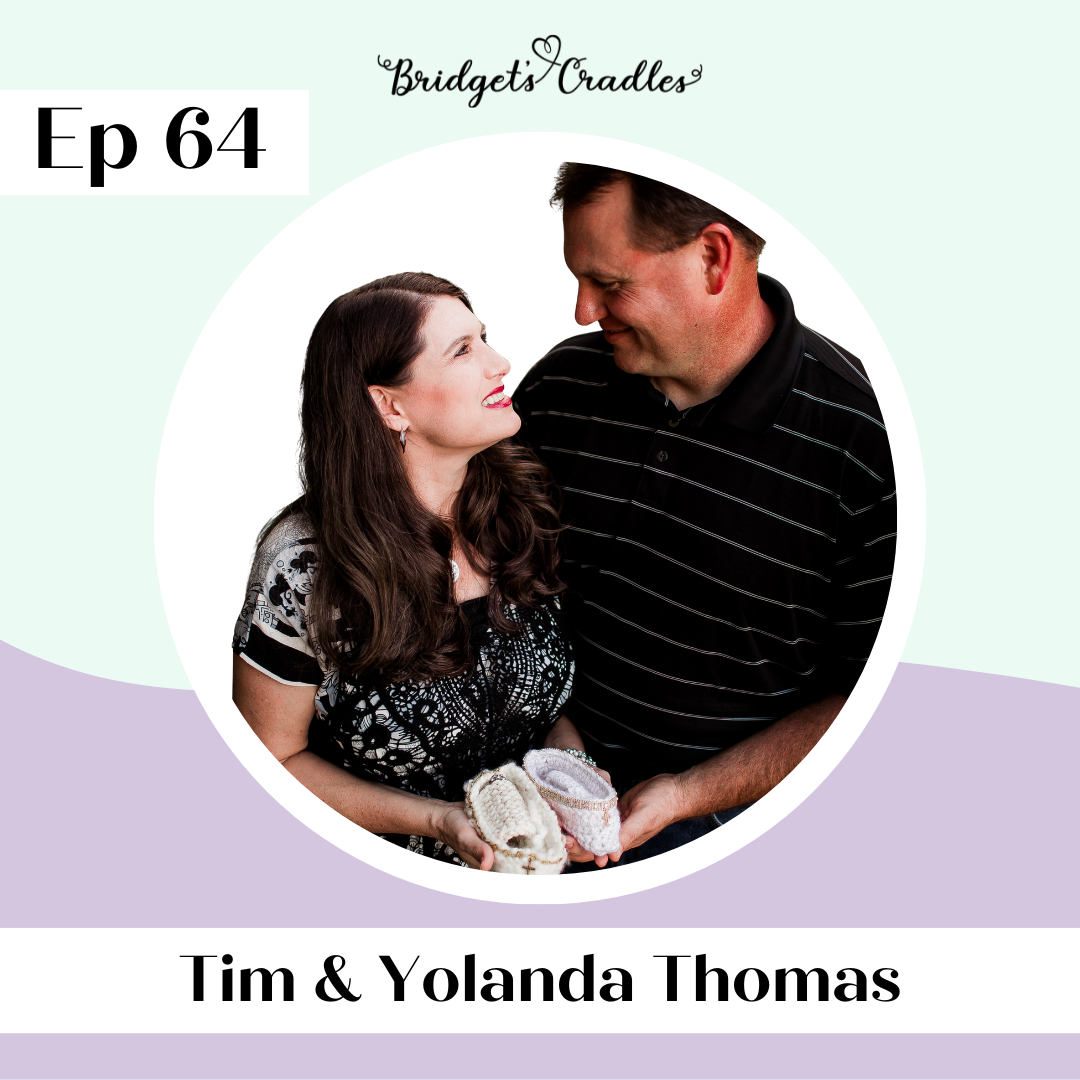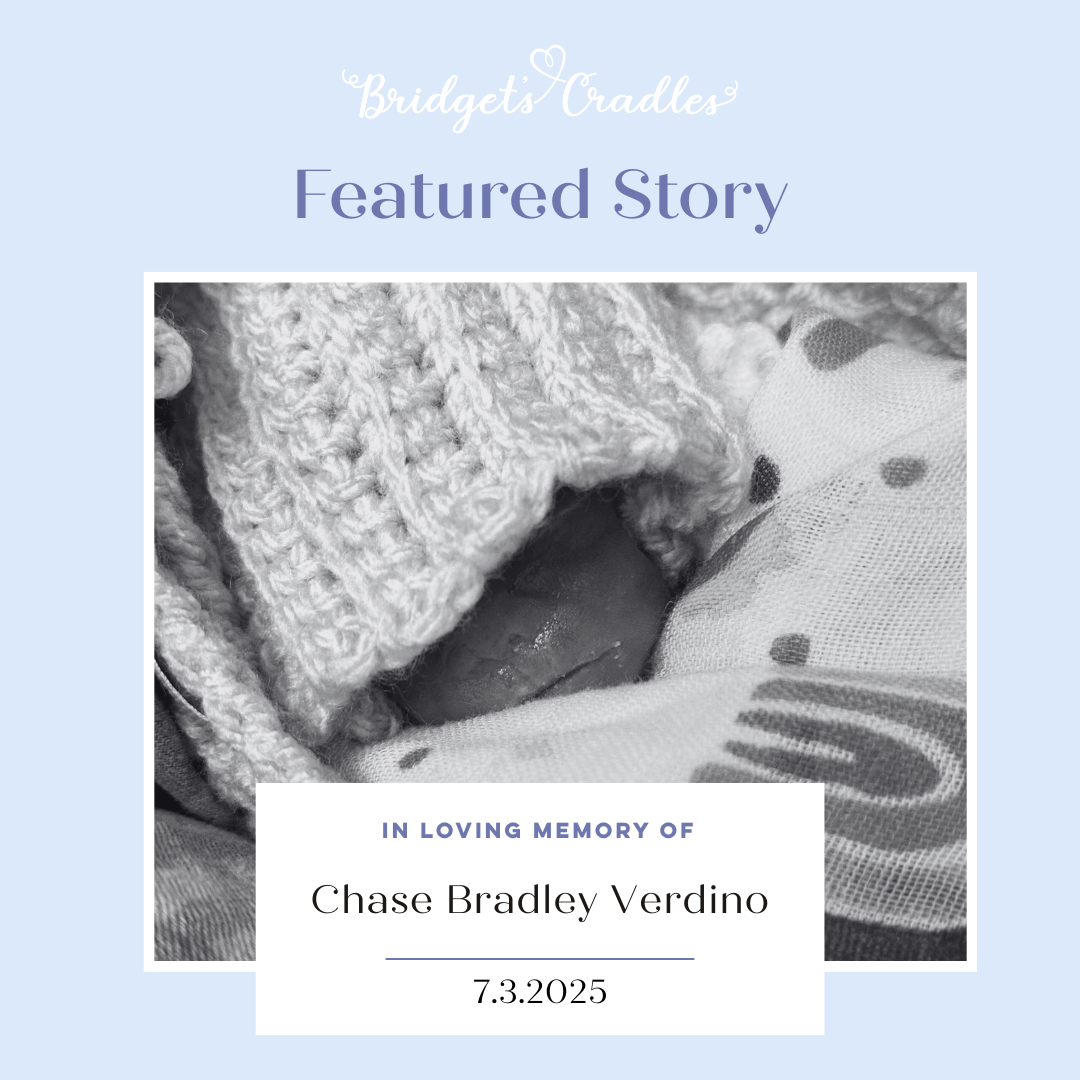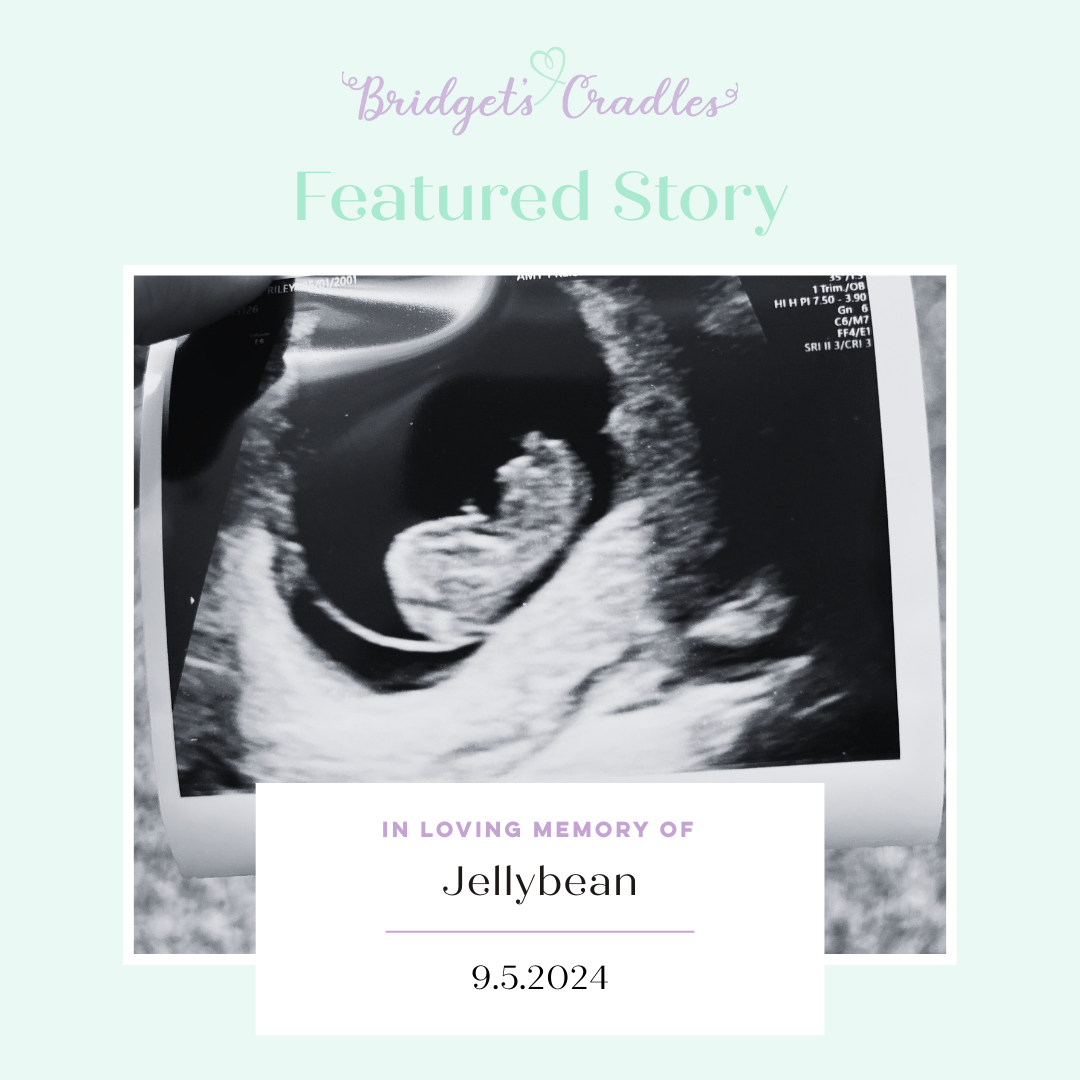Wave of Light | October 15, 2025 Register Now
registration open!
56 | Where is God in My Grief and Trauma? | Janet Boxx
January 1, 2025
filed under
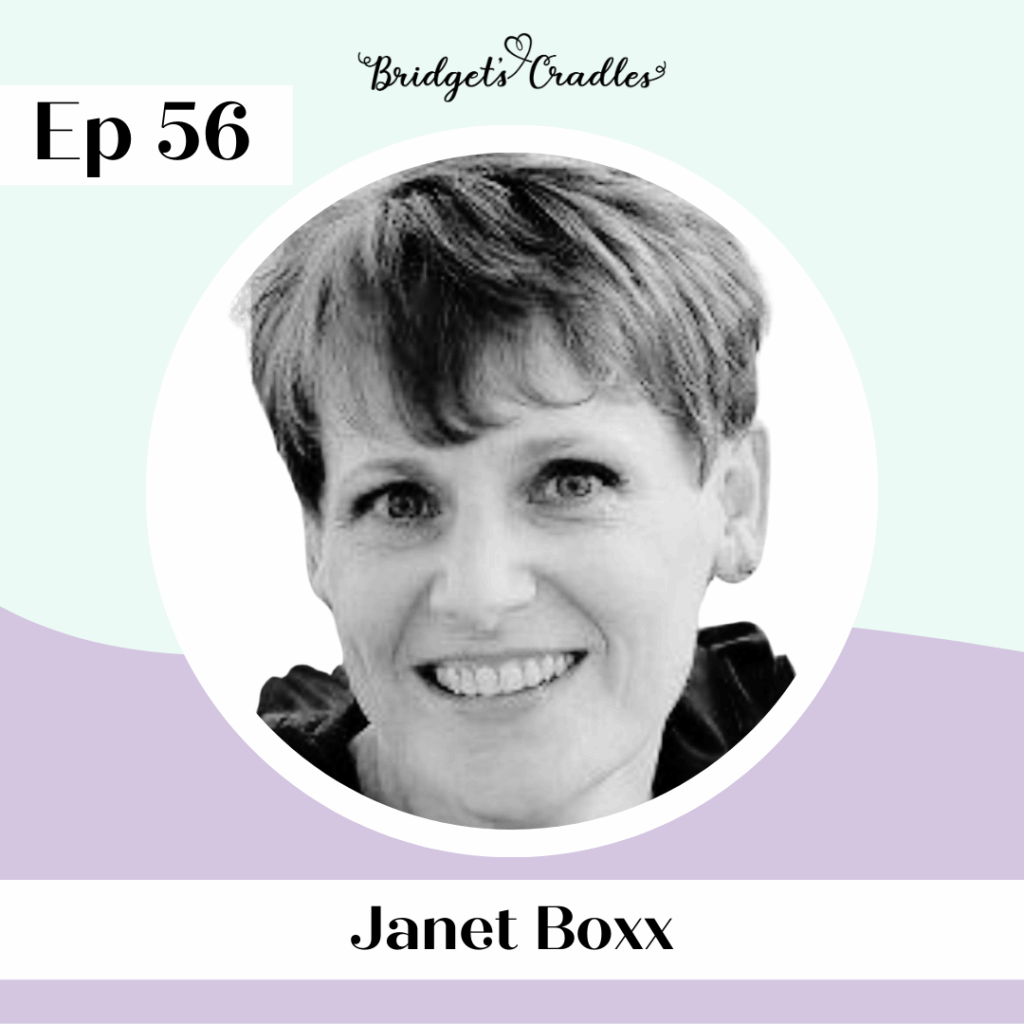
Join us for a hope-filled conversation with Janet Boxx, a mother who has faced indescribable trauma and loss in her family. Janet shares her profound journey, beginning with the stillbirth of her son, Cole, the developmental disorders of her daughters Gracen and Katie, the tragic loss of her daughters Bethany and Katie in a car accident, and the impact of Gracen’s resulting disabilities.
Through her story, Janet emphasizes the importance of reconciling grief with faith and how she uses her pain to educate others about loss, child disability, and trauma. She runs a blog, speaks in defensive driving classes, and facilitates biblical grief support groups. Janet’s vulnerability about her struggles is a testament to the healing she has found in Jesus. No matter how deep the pain, Janet exemplifies that hope still exists.
In this episode, we discussed:
Navigating multiple traumas/losses
Do I have PTSD?
Feeling invalidated by others
Spoon theory, emotional energy, and how it relates to grief
The importance of Scripture in our healing
Reaching acceptance/approval of God’s choices
Trusting in God’s sovereignty (this is hard!)
Physical protection vs. spiritual protection
Jesus’ love for us demonstrated on the cross
“Suffering well” for the Kingdom
Full transcript below.
MEET OUR GUEST

Janet and her husband, David, have been married for 37 years. In June of 1992, their first child and only son, Cole, was stillborn after becoming entangled in his umbilical cord prior to birth. Three daughters, Bethany, Gracen, and Katie, completed their family. Around a year of age both Gracen and Katie began missing developmental milestones and in the spring of 2012 were diagnosed with ARSACS, a rare and progressive genetic neuromuscular disease.
December of 2013 brought additional heartache when the family was involved in a motor vehicle collision as they returned home from celebrating Christmas with family. Tragically Bethany (20), and Katie (16), were killed and Gracen (18), was left wheelchair bound.
Janet began a blog as a means of reconciling the harsh circumstances of life with her faith and educating others about the realities of grief, child loss, chronic disease, disability, depression, anxiety, and trauma.
She’s written articles for “The Mighty,” an online magazine, and contributed a chapter to Until Then: Stories of Loss and Hope. Once a month Janet speaks to adults and teens sentenced to court-mandated defensive driving classes for the Northwest Arkansas Driving Academy. She helps facilitate the GriefShare program at her church and an online Bible Study for bereaved moms.
Janet and David facilitate multiple child loss gatherings for Our Hearts Are Home, a non-profit ministry to bereaved parents. Janet, David, and Gracen reside in Bentonville, Arkansas.
Connect with Janet:
Facebook: Janet Boxx
Instagram: @boxxjanet
Website: www.boxxbanter.com
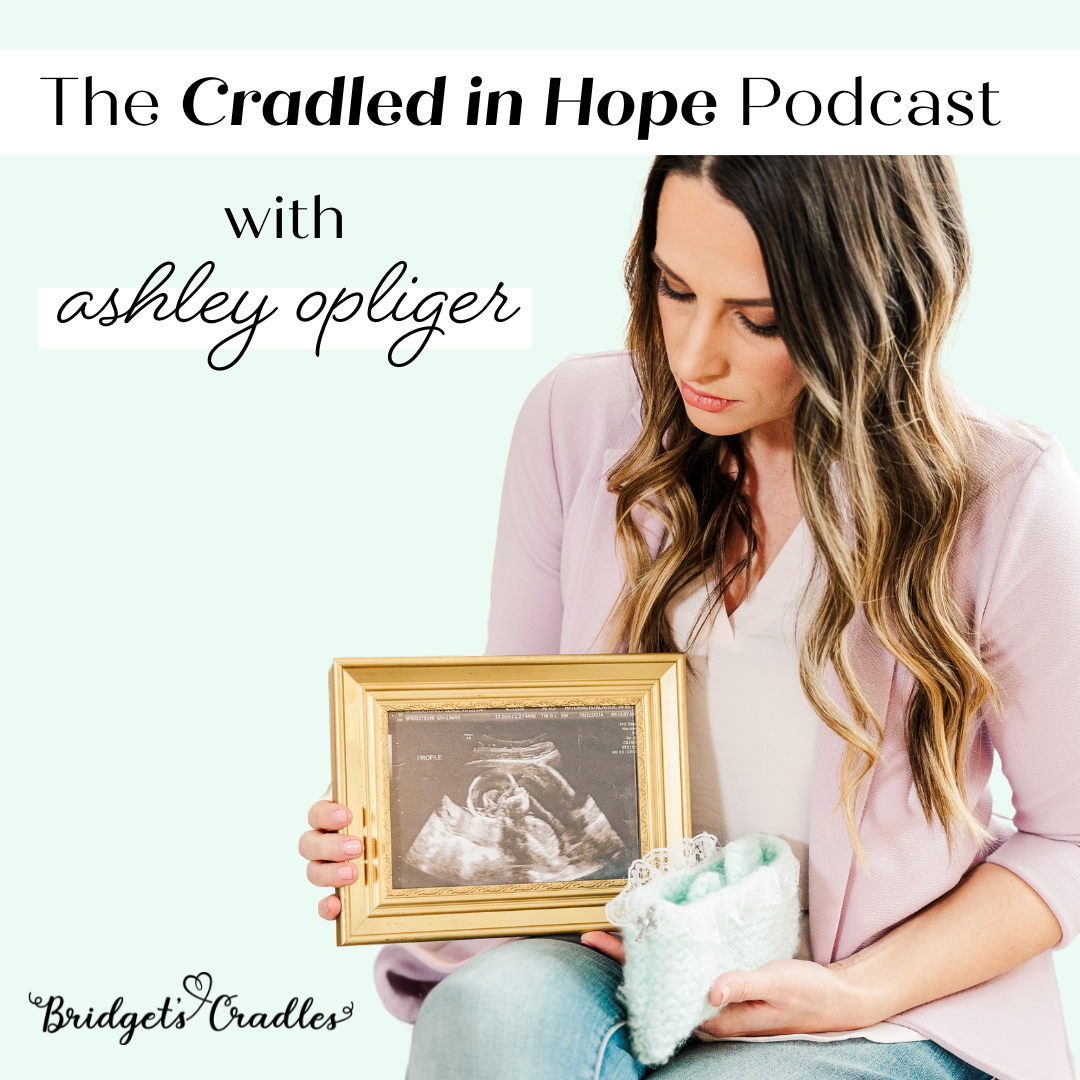
New episodes will be shared on the 1st of every month. Don’t miss a single episode…subscribe wherever you podcast!
Please also leave a review to help spread the message of hope with other grieving mommas!

MEET OUR HOST
Ashley Opliger is the Executive Director of Bridget’s Cradles, a nonprofit organization based in Wichita, Kansas that donates cradles to over 1,600 hospitals in all 50 states and comforts over 30,000 bereaved families a year.
Ashley is married to Matt and they have three children: Bridget (in Heaven), and two sons. She is a follower of Christ who desires to share the hope of Heaven with families grieving the loss of a baby.
Connect with Ashley:
Facebook /ashleyopliger
Instagram @ashleyopliger
Pinterest /ashleyopliger
www.ashleyopliger.com
Follow Bridget’s Cradles:
Facebook /bridgetscradles
Instagram @bridgetscradles
Pinterest /bridgetscradles
www.bridgetscradles.com
JOIN OUR CRADLED IN HOPE COMMUNITY FOR GRIEVING MOMS
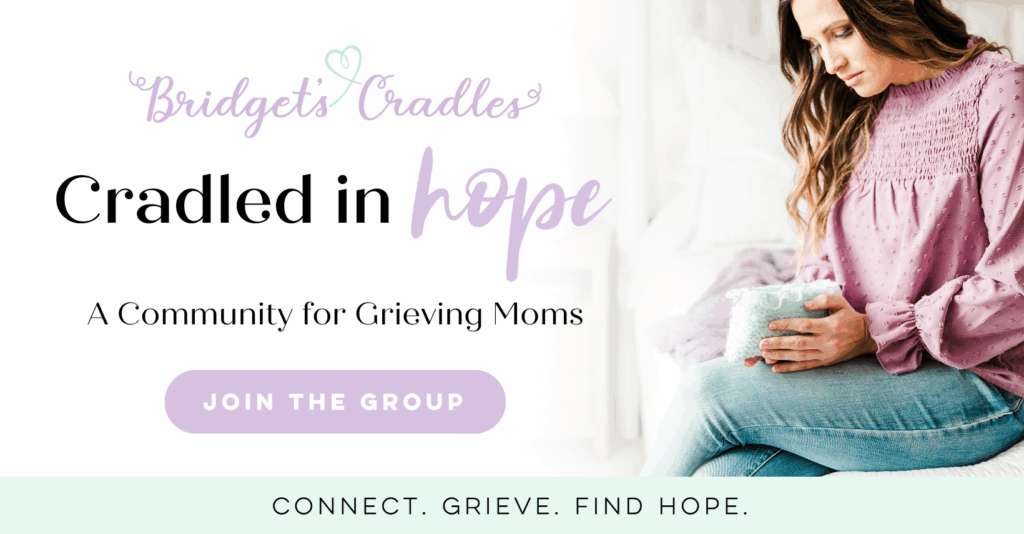
EPISODE TRANSCRIPT
Episode 56 | Where is God in My Grief and Trauma? | Janet Boxx
Ashley Opliger: [00:00:00] You’re listening to the Cradled in Hope Podcast. I’m your host, Ashley Opliger. I’m a wife, mom, and follower of Christ who founded Bridget’s Cradles, a nonprofit ministry in memory of my daughter, Bridget, who was stillborn at 24 weeks.
Cradled in Hope is a Gospel-focused podcast for grieving moms to find comfort, hope, and healing after the loss of a baby. We want this to be a safe place for your broken heart to land.
Here, we are going to trust God’s promise to heal our hearts, restore our joy, and use our grief for good. With faith in Jesus and eyes fixed on Heaven, we do not have to grieve without hope. We believe that Jesus cradles us in hope while He cradles our babies in Heaven.
Welcome to the Cradled in Hope Podcast.
Ashley Opliger: [00:00:48] Welcome back to another episode of Cradled in Hope. I am so honored to have a good friend on the podcast today. today. Her name is Janet and I met her through a mutual friend that we have here in Wichita.
Janet and her husband, David, have been married for 37 years. However, in June of 1992, their first child and only son, Cole, was stillborn after becoming entangled in his umbilical cord prior to birth. Three daughters, Bethany, Gracen, and Katie, completed their family.
Around a year of age, both Gracen and Katie began missing developmental milestones and, in the spring of 201,2 were diagnosed with a rare and progressive genetic neuromuscular disease.
December of 2013 brought additional heartache when the family was involved in a motor vehicle collision as they returned home from celebrating Christmas with family.
Tragically, Bethany, at age 20, and Katie, at age 16, were killed, and Gracen, at age 18, was left wheelchair-bound.
Janet began a blog as a means of reconciling the harsh circumstances of life with her faith and educating others about the realities of grief, child loss, chronic disease, disability, depression, anxiety, and trauma. She’s written articles for The Mighty, an online magazine, and contributed a chapter to Until Then, Stories of Loss and Hope, which is available on Amazon.
Once a month, Janet speaks to adults and teens sentenced to court-mandated defensive driving classes for the Northwest Arkansas Driving Academy. She helps facilitate the GriefShare program at her church and an online Bible study for bereaved moms.
Janet and David facilitate multiple child loss gatherings for Our Hearts Are Home, a nonprofit ministry for bereaved parents. Janet, David, and Gracen reside in Bentonville, Arkansas. I look forward to having you hear her story now.
Ashley Opliger: [00:02:35] Welcome, Janet, to the Cradled in Hope Podcast. I’m so glad to have you here today.
Janet Boxx: [00:02:39] Thank you for inviting me. I’m thrilled to be here and be able to visit with you.
Ashley Opliger: [00:02:44] We were introduced by some mutual friends that live here in Wichita, and we were able to connect a couple of months ago and get to know each other, and I got to hear your story.
And I remember when I was speaking with you, I just felt, “Wow.” You’re like this modern Job, where you’ve just been through so much trauma and so much loss. And I kept thinking, like, “I can’t imagine going through everything that you’ve been through and still having faith and still pointing people to hope in Jesus.”
And shortly thereafter, I went through the biggest trauma in my life in losing my Dad, who was killed by a drunk driver in August, but I feel like I have even more compassion and empathy for your story and what you’ve been through. And so I’m just really honored to get to share your story and have our listeners hear what you’ve been through but what God has done in the midst of it. So, would you introduce yourself and share your story?
Janet Boxx: [00:03:41] My name is Janet Boxx. I live in Bentonville, Arkansas, known to be the home of Walmart. I’ve been married for 30-plus years to my husband, David, and we are parents of four children, one son, Cole, and three daughters, Bethany, Gracen, and Katie.
Our son, Cole, was stillborn in 1992. His story really begins with infertility. At the time, the doctor told me I just wasn’t ovulating, and he put me on a fertility drug. And it was something we didn’t really talk about much. I’m pretty much an open book, but the church didn’t really know what it thought about fertility drugs at the time, and so we just didn’t really go there.
But anyway, after I conceived, that pregnancy was really pretty normal, and there came a point at the end of the pregnancy where I started having Braxton Hicks contractions, and the baby was moving. It was hard for me to tell the difference, a little bit. between the two.
We had a baby shower at my office, and a colleague asked if she could feel the baby move. And we pushed around on my belly, and nothing happened. And I didn’t think a whole lot of it, I just thought he was sleeping. But the next day, Saturday, my husband and I were shopping for Father’s Day gifts, and I told David, I said, “I don’t think the baby’s moving.”
And David’s pretty optimistic, and he thinks I’m just a worrier, which I am to a certain degree, but we went home, and I drank some apple juice because our childbirth classes had told me that that’s how you get the baby to move because of the high sugar content. And the baby didn’t start moving.
And my husband was completely unconcerned, had laid down for a nap. And I called the hospital and they said, “Come.” And so, the next day, which just happened to be Father’s Day in 1992, Cole was born still. They found that he had his umbilical cord wrapped around one arm, and then several times around his throat. So it was pretty obvious what had killed him.
One thing I didn’t realize is that I felt it happen. Several days before, I had been to my mom’s house, and we were doing curtains for the baby room, and I just said to her, “The baby’s moving really funny.”
And she said, “Why don’t you just lay down for a minute and see if it goes away,” which it did. But I had forgotten all about it, and she was at my home after I’d returned home from the hospital and mentioned it. And it just killed me.
I thought, “There’s a word for how he was moving, and that word was thrashing.” And I just felt like, “What kind of mother could I be if I couldn’t even recognize an emergency when it happened?”
Not that, had I known, I could have prevented it, because by the time I got to any emergency help it would have been all over anyway. But still, it really had a profound impact on me and fed into insecurities.
So we lost him in 1992. 21 years later, David and I had three girls, and it was kind of a difficult time. The year before, my two youngest daughters, Gracen and Katie, had been diagnosed with a rare degenerative neuromuscular disease. And Gracen was losing the ability to walk, and it was evident that she was going to be wheelchair-bound soon.
And David lost his job six months prior to a collision that we were in. We had gone to Kansas City to celebrate Christmas with family and were returning the day after, and our car was hit by an unlicensed driver. He had been rear-ended by a speeding driver, and the unlicensed driver’s truck crossed into our lane of traffic and hit our vehicle, pushed it off the edge of the road and then it rolled over.
And Bethany was thrown from the vehicle and died of severe head trauma. My youngest, Katie, was strapped in, and she had a cut down her forehead, but it wasn’t bleeding, and she had also died of severe head trauma. And then Gracen was tossed around the vehicle and was in critical condition and life-flighted to a hospital in Joplin, Missouri.
We also had a foreign exchange student in the vehicle with us, and he was life-flighted to another hospital in Springfield, Missouri, and David and I were taken to a hospital in Arkansas.
So, that day, we lost our oldest and youngest daughter, and our middle daughter Gracen’s life was really hanging in the balance at that point in time. So, that’s the story of the events that occurred in losing our children.
Ashley Opliger: [00:09:18] Janet, I hardly have words. My heart hurts hearing you recount your story and all the pain that you’ve been through, and losing your children in such tragic ways, and even after going through everything you did with Cole and how traumatizing that was for you to know the moment that he died and have all of these fears probably from that point forward, bringing three children into the world.
You and I had talked about this before, but once you’ve been through something traumatic and hard and you lose a child, even in the womb, I think there’s this fear that something else is going to happen to someone else in your life, to a family member, to a future child.
And so you have these three girls, and then you walk through the diagnosis that you went through with your two girls, and then this tragic accident that took their lives, and you were there present in this, and so you experienced the trauma of the accident and seeing everything that you saw. Would you share, how do you cope with that kind of trauma in your brain and in your body and facing those fears and triggers afterwards?
Janet Boxx: [00:10:38] Gosh, that’s a hard question. I didn’t really, didn’t have a lot of knowledge about trauma.
In Mark 6, I think it is, Jesus went to His hometown of Nazareth, and He preached, and the people were offended. And He said, “A prophet is not welcome in his own town,” and I think that friends and family have this familiarity with you, and so if you talk about trauma and stuff, they think you’re more self-diagnosing, maybe you want attention or pity or whatever.
There are things that are happening, and you don’t know why. “Why can’t I get online and pay bills? Why, if we’re going out of town to see family, can I pack two shirts in my suitcase and then I have to lay down for 30 minutes because I cannot manage to put more clothes in the suitcase? Why do I break out in a sweat every time I leave my house,” those kind of things. You just don’t know what they are.
Like I said, David was unemployed at the time, and I had sought some grief counseling for Gracen, and I was most concerned about her. And the counselor came and told me she had a pro bono spot she could give me, and so that was really helpful to me.
And I asked her, “What is normal in this situation? How do people that have had more than one trauma, because if you get online and you Google around, how many bereaved parents do you find or how much study is there on bereaved parents that have had multiple traumas?”
She basically asked me how I would describe my emotions. And I talked about feeling detached from what was happening and feelings of numbness, like people stood in front of me and sobbed, and I was just separate from it, like I was observing it [from the] outside.
And she said, “Detachment and numbness, those are the two words people use.”
And one day, I asked her, “I don’t know what’s going on,” and we hadn’t talked about it in any of our counseling, but I said, “Do I have PTSD?”
She said, “Yes, you do.”
And it’s like, “Why didn’t you tell me?” So then I knew what was going on, because you just think you aren’t handling it well. It’s easy to be self-critical, especially when you have other people who are trying to encourage you to move along.
I think the hardest thing was invalidation, is that people had these expectations, which even going into the second loss, I knew were unrealistic because I’d experienced the first loss. But still you’re measuring yourself by these notions you had that you shared with them.
And part of you standing up inside going, “This is not realistic,” and the other part of you is criticizing yourself because you’re holding yourself to a standard that’s unreasonable.
And so you have these internal wars going on.
I think a big part, for a long time, it was just getting up and putting one foot in front of the other. My entire focus was on meeting Gracen’s needs. This was a years-long struggle, and this invalidation, I had somebody recently ask me, “Why did it take you so long?”
And within that question is the inherent idea that it shouldn’t have, right? So there’s not an inquiry, it’s an accusation hidden within a question. When you have these things going on, people don’t recognize.
So like [with a] car accident, we’re out of a vehicle. We have medical issues we’re trying to deal with. We have legal issues we’re taking on. And we’re grieving loss.
You have all of these other factors that are all wrapped up in the grief, and people just expect, they think, “Oh, you’re dealing with one thing. You’re dealing with grief. Why aren’t you moving ahead faster?” It’s because, well, I got bypassed by legal issues and financial issues and whatever they were.
So if you ask me, how did I do it? If I was personally evaluating myself, I’d probably say not very well. But on the other hand, what I know now is I was doing better than I thought I was.
Ashley Opliger: [00:15:22] I think so often in grief, you’re just going through the motions and you’re doing what you have to do in the day to get through, because you’re like, “What other choice do I have?”
And so there’s something that I was thinking about that my counselor has recently been talking to me about, and it’s this topic or idea of spoon theory. I don’t know if you’ve heard of that before, but it’s actually for people who deal with chronic pain or a diagnosis like Gracen has where basically the idea of it is that you get 12 spoons in the morning, and you don’t get any more spoons the rest of the day.
And so when you’re thinking of it from a chronic pain standpoint, it’s, “Okay, well, if getting up and making breakfast and taking a shower is going to take four spoons, whereas the person without chronic pain is only going to take one spoon, that person’s going to have to restructure their day to get through the things they need to get done because they’re going to run out of spoons.”
And so she was relating it to me in the sense of grief and emotional energy. Because when you’re grieving, you don’t have the same level of energy that you were when you weren’t. Just like you said, having to pack for a trip or pay bills or do something that you normally did that was easy for you.
I’m a super productive person. I literally measure my days based on how much I can get done. And so for me, it’s hard trying to be productive yet grieving at the same time. And I’ve had to give myself a lot of grace to say, “I’m not going to be as productive in this season as I normally am, and that’s okay.” I need to give myself permission.
But coming back to the spoons, if something takes emotional energy, whether like for me right now, with everything that happened with my Dad, we are dealing with legal issues and financial stuff and paperwork and all of these things, and it’s taking energy.
And so it’s like in a day, if you have to do something that’s very triggering and very emotional, that’s going to take away your emotional energy to do something else during the day.
And so if you’re listening to this and you’re grieving a baby, and it’s hard to just get through your day, it’s hard to do the things that you used to do, try to think of it in terms of the spoons and have an understanding of what is taking emotional energy and what is filling your cup or helping you rest or helping you get through the day without expending so many spoons.
You can actually look it up and it explains it probably better than I just did, but that was helpful for me. Do you feel that the analogy is helpful in your circumstances?
Janet Boxx: [00:18:01] There’s a big part of you where you need to cut out the voices on the outside so that you know when you’ve hit capacity. And I don’t think I really recognized how utterly exhausting [it was]. I ended up writing a blog for a while, and there was one, I was just recounting my thoughts, and it was like, “I’m just so tired.”
And tired kept coming out. “I want _____ And I can’t fill in the blank because everything I want is something that’s not possible for me to have.” You’re processing all of these things, and it’s that little thing on your computer, that little circle, I call it the dog chasing his tail, and it’s just rolling, rolling, rolling.
That’s going on in your head, no matter what you’re doing on the outside. You could be washing dishes, and it’s utterly exhausting. I think for me, too, working through the trauma and stuff was being able to identify what this is and find out is this normal.
But also I was doing that with everything about my faith. And when somebody would quote Scripture to me, “You just need to trust more,” that kind of thing, or have more faith, it’s not that I lacked faith in what God could do. It’s that I feared what He would allow.
And if something happens to you that’s really negative and is rare, everybody’s going to try and tell you that won’t happen again. And I am living proof that those kinds of things, that’s not true. They can happen again. And I really need people to acknowledge that.
If you ask me what my favorite verses in Scripture are, it’s usually not the ones that give people all the good feels. I’d say it was John 16, where Jesus says, “In this world, you will have trouble, but take courage, I have overcome the world.” It’s, you told me the truth.
We have these unconscious beliefs, as believers, that are residing in the back of our brains. And we might not even know that they’re there or that we think this way until they’re challenged. And we have these ideas that if we are faithful, if we’re doing the things we should be doing, then bad things are not going to happen to us. It’s like this contract we’ve decided that we have with the Lord, but He never told us that.
And I had to look at Scripture and say, what can I trust Him for? What did He tell me I could trust Him for?
Whenever anybody spoke to me, whatever I saw on TV or in the world around me, everything that I heard, everything was filtered through the lens of loss.
There’s this old TV show, A Different World, where Dwayne Wayne had these cool glasses at that time, they were flip-up sunglasses. And he’d flip them up and flip them down. The thing is, you’re wearing the shades all the time. Everything is viewed through that, but also through your hearing. And then when you hear things, you think, “Is that true? Is that really what Scripture said?”
I had a grief counselor who said to me, “What else does the Bible say?” I was so hopeful. Because people like to cherry-pick verses. Everybody is really well-intentioned, but if they have not suffered … There’s suffering and just, “I broke my ankle,” but it heals, you get to walk on it again. There are traumas that are not recoverable. And we want to apply spiritual truths to everything equally, and it’s just not the same.
C. S. Lewis talked about grief being like an amputation. And it’s, yeah, you get one of your legs amputated, and you heal from that, but you have to learn how to walk with a prosthetic. You have to learn how to redo life in different ways.
Now, especially after the girls passed, I was really focused on, “What does Scripture actually say?” And I think sometimes it came across as very cynical, and probably it was. I mean, I was wounded.
And so the first time I opened my Bible after the girls died, I just randomly flipped it open, and it was in a psalm and it talked about God’s protection. And in my mind, I thought, “Well, where was God when this happened?”
And immediately, it’s not like I heard an audible voice, but immediately the following thoughts came to mind, as if God was saying them to me, “I protected you. I protected your husband. I protected Grace. Bethany and Katie’s number of days were up. And so I had to lift my hand of physical protection from them, but I never lifted the protection from their souls.”
But still, man, I shut my Bible and I can’t tell you when I opened it again.
I like to think of Scripture as full of hard truths and it takes the Holy Spirit working within you for you to be able to accept and deal with some of those hard truths.
I was resigned to bad events in my life, and I really thought that resignation and acceptance were the same thing. But what I realized over time is, well, I could look at Scripture and I could process my thoughts and feelings against Scripture and come to terms with them, make peace with them. There was this angst I just couldn’t get rid of.
And I did not realize that what was happening was my free will, my human nature was standing up saying, “Yes, God is sovereign. He has the right to do what He wants with my children, with my life, whatever,” that inside my will was saying, “But it’s not okay.”
And I think the distinction between resignation and acceptance for me was approval. Do I approve of God making the choices He’s made?
I’m still learning from grief. I have an online Bible study I do with bereaved moms, and we did a study on the names of God, and we really looked into God’s character. And there was an emphasis on His holiness in one of His names, and it talked about His moral purity.
This is what I took from it: God cannot make a choice for my life that is for His glory and not for my well being, because He’s ethically pure. So when He makes a choice, everything He offers is for my well being. And He gets glory as a result of that.
Now that’s a really hard thing to deal with when you’re looking at child loss. But I had already figured out that what God calls good is different than what I call good. What I call good has everything to do with convenience and comfort. What God calls good is me being Christ-like, and sometimes suffering is the tool.
That’s not to say that God is the author of all suffering. I believe that our God is a God of redemption and everything He works at is all about redeeming sin and corruption in this world. When He allows somebody to hurt me, then He’s going to work His redemption plan within me.
Man’s free will and God’s protection and how do those work together? One, child loss taught me a lot of lessons about the Lord. And while I’d never hold up my hand and say, “Here I am, torture me a little more,” I would not exchange the lessons that I’ve learned and the changes that it’s made within me, because they’re extremely valuable.
Ashley Opliger: [00:26:57] And that is a hard thing to say. And if you’re listening and you find that thought to be inspiring, but you’re like, “I don’t see how I could ever feel that way about the loss of my baby or the loss of my child,” that’s completely understandable.
Even for me right now, I’m 10 years out from Bridget, and I feel that way about Bridget and her life and her death, but I don’t feel that way about my Dad’s. And I don’t know for sure, I don’t know if it’s just the proximity and the amount of time and grief, but I do think there’s something that God does with time and healing and perspective.
And to come back to something that you said that I thought was so beautiful is about His protection, because I know that something I struggle with is, “Why didn’t You protect Bridget in my womb? Why did You allow my body to be an unsafe place for her? Why did You let my Dad get struck by a drunk driver? Why did You not protect him? Why did You not change something about that night to make that not happen?” And I’m struggling with that a lot right now, to be honest.
But to your point about protection, yes, our babies and our children, if you’re listening and if you’ve lost a child or a loved one tragically, or you lost a baby in your womb, they may not have been physically protected, but we do believe that they have eternal souls and that they’re in Heaven forever.
And that’s our greatest hope is that their salvation is certain. And we have that to look forward to.
It’s so hard to look at things from an eternal perspective because we are human beings that are in a world with time, and so we view things from our lens. And I think so many times, when I finally get there, and I’m with Bridget and I’m looking in her eyes, and I’m with my Dad again, it’s at that point I’ll be able to say, “Okay, this was light and momentary.”
But right now it feels nothing like light and momentary. It feels heavy and eternal is how our suffering feels when you’re going through it.
Ashley Opliger: [00:29:02] We hope you are enjoying this episode so far. We want to take a quick break to tell you about some resources our ministry provides to grieving moms.
On our website, bridgetscradles.com, you can find hope-filled resources on grieving and healing including memorial ideas, quotes & Scripture, featured stories, and recommended books and other organizations. We share ideas on how to navigate difficult days such as due dates, Heaven Days, and holidays.
In addition, every month I lead Christ-centered support groups for bereaved moms called Hope Gatherings, both in-person and online. You can find a list of upcoming dates and sign up for our next support group on our website.
Lastly, we would love for you to connect with us on Facebook and Instagram. You can find us on these three pages: @bridgetscradles, @cradledinhope, and my personal page @ashleyopliger. You can also join our private Cradled in Hope Facebook group for grieving moms to find community. We would be honored to hear your baby’s story and be praying for you by name. Now let’s get back to our episode.
Ashley Opliger: [00:30:11] And so I want to come back to another thing that you said I thought was very profound. You were talking about God’s will and His sovereignty and free will and all of these things and our children’s days are numbered.
And we know that biblically to be true about every person on this earth, our children, our loved ones, even our own lives. And so I think there’s a part for me that’s: You want to rest in the sovereignty of, “Okay, well, Bridget lived out her number of days. My Dad lived out his number of days.”
But then I go, and I’m like, “Why did You number them like that? And why did You let them die like that? It just feels so cruel and so awful.”
And so would you speak to the mom’s heart who’s listening and they’re like, “I do believe God’s sovereign. I do believe that He numbers our days. But I don’t understand why He would number them like this. And I don’t understand why He would let my baby or my child or my loved one die in the way that they did, in such a tragic or traumatic situation.” Can you speak to that feeling?
Janet Boxx: [00:31:11] Let me back up just a little bit, because one of the things I really struggled with was I knew that my son had gone to Heaven, but I didn’t know where Scripture said that. And I felt too vulnerable to ask. I had this great pastor, and I could not bring myself to ask him, “Where does it say that in Scripture?”
So I cannot give you the exact passage in Scripture, but the one that I held onto was of King David when he lost his son, and he said, “I will go to him, he shall not return to me.” And that gave me a lot of comfort.
Another thing I wanted to add is, why did He allow my child to be conceived and not born alive? Or to die shortly after their birth? Or to have such a short lifespan?
One thing I really concluded was that knowing why doesn’t make painful things hurt less.
And honestly, if God had told me why He took Cole, everything within me would have been saying, “But, but, but …”
I am human. I am not holy. I am just progressively on that path. And so I would not always agree with His decisions. And I think sometimes He doesn’t tell us why because it just hurts us more. You know, we dig in our heels, and it just hurts us more.
So knowing why might make things hurt worse, but also my ability to see things from His perspective is limited by my humanity. So He might give me the best answer in the whole wide world, and I just couldn’t comprehend it. I would not be developmentally prepared or equipped to really understand His purposes and His reasons.
I have thought that when I get to Heaven, then I can ask why, and He’ll give me an answer and I’ll understand. But I’ve also thought that when I get to Heaven, why might be the last thing on my list. I will just be so filled with joy of being with Jesus, the ability to get to know this son who’s such a mystery to me, and to be reunited with my daughters and other family members that I miss, maybe why will be the last thing I want to ask.
But I also wanted to address the idea of why God might take someone, I happened to attend a support group meeting for bereaved parents, and there was a man there, and he tossed out this verse, and I had never heard it before, but it’s in Isaiah, it’s 57:1-2. Now, I’m going to read it to you in the Amplified Version and add in some of the clarifying comments that are part of that translation. It says,
“The righteous man perishes and no one takes it to heart. Faithful and devout men are taken away while no one understands that the righteous person is taken away to be spared from the calamity and evil to come. He, in death, enters into peace. They rest in their beds, each one who walks straight and in his uprightness.”
That was really helpful to me, because I don’t know what God might have rescued my children from. And I think it might have been something I would have really had a much more difficult time dealing with. And maybe for you, Ashley, that you might be able at some point to contemplate that God rescued your Dad from something that would have been far worse, and that it was a grace to do so, and that it was loving to do so.
I talked about learning about the character of God and His moral purity. And the other thing I really have clung to lately is the idea of His love. There’s a couple of different words for love in Scripture, and one means loyalty and commitment.
It means that regardless of how I respond to His overtures of love for me, that He won’t stop loving me, that He won’t stop extending opportunities for me. And the other part of it was that His love is affectionate, and I really needed to hear that because I knew God’s love was unfailing but I didn’t necessarily feel like He liked me.
And I think what I have learned is that there can be really popular people, like in your high school or in your college or at your office or whoever, they’re charismatic people and people respond to them, and they’re very well liked. But they don’t feel loved.
And then there’s people who just feel like they’re in the background, and they know their parents love them, they know their spouse loves them, and their kids love them, but they don’t really feel liked. And it seems like people are one or the other.
But God is telling us He doesn’t just love you. He’s not just committed to your well-being. But He loves you with affection. You don’t ever have to worry about whether you’ll be welcome there.
It’s kind of like the old Cheers bar. They’re always glad you came, from the song. And it’s like He created you the way He created you, with intention. And He likes who he created. That is just an amazing concept for me.
Ashley Opliger: [00:37:29] That’s beautiful. And it’s interesting that you brought that up, because this weekend our pastor was saying whenever you question God’s love, all you have to do is look at Jesus, because Jesus died for us when we were still sinners and we were His enemies.
And this is what he said: It’s one thing to die for a friend, but to die for someone who was rebellious and didn’t even want a Savior, and I’m talking about humankind right now in general. We just don’t have to look any further than the cross to see His love demonstrated and what He went through.
And that’s something I’ve been really thinking about recently is the trauma that He went through, and His disciples and His mother went through watching Him be tortured on a cross and die the kind of death that He did.
It sounds pretty morbid to think about it like that, but I feel as a follower of Christ, we owe it to Him to really think about what He went through for us, that this kind of love cost Him.
There was physical and emotional suffering and pain that He went through to die for our sins and to lead us to His Father and give us the chance to be redeemed and to have an eternal life with Him in Heaven.
So often when my mind goes all over the place with, “Why, God,” and, “Why are You allowing this in my life,” I just have to keep focusing my eyes on Jesus and on Heaven because that is our ultimate hope, and Heaven is so great because Jesus is there.
And to your point, when we get there, we might not be able to ask why, because we’re going to fall face down in His glory and His presence. We’re not going to probably be nitpicky and asking Him all these questions. We’re just going to be in awe and wonder at the place that we’re in and the Person’s presence that we’re in.
So I love that you shared that because that is such an amazing hope, and it’s worth our time to really fix our eyes and our affection there because that’s where we’re going.
And if anything, what we’ve been through, what you’ve been through, what I’ve been through, what our listeners have been through in losing a child, we know life is but a vapor, and that includes our own lives.
And so there’s so many times I think, “Oh my goodness, I have to live the rest of my earthly life and wait so long to see Bridget and get to see her and know her the way that I wanted to know her as my daughter.” And I get so depressed thinking about how many years left I have to wait before I get to see my Dad again.
But I think to myself, “It is such a vapor. I could end up there today. I could end up there next week.” Life goes fast, and we’re going to be there sooner than we realize. And once we’re there, all things will be made right, and all of our tears will be wiped away.
Janet Boxx: [00:40:21] One thing that I grabbed onto was that Jesus endured the cross for the joy set before Him. He knew that His joy was off in the distance, and it was the eternal joy.
And one of the things that has helped me heal is really developing a more eternal perspective. I don’t look at everything as how it is in the here and now. I look forward with hope. And by that, I mean not like wishful thinking, but the confident assurance that Heaven is going to be far better than I can even imagine.
In addition, Scripture tells us that going to the cross qualified Jesus to be our high priest. It said that He learned obedience, and when you look at that Scripture, it’s kind of a head-scratcher. He’s someone who never sinned. What do you mean He learned obedience?
But if you look at commentaries, they would tell you that He was faced with the place in His humanity where everything desperate within Him was wanting to live. And it was hard to lay down His life.
We think that everything Jesus did came easy to Him because He was God as well as man. But He was fully man. And in order for Him to be our high priest, He had to understand what it was like to live like a human, to learn to place His trust in the Lord, and to learn to accept suffering for a person.
And in our churches, we don’t talk that much about suffering. We gloss over it so much.
But over and over in Scripture it tells us that if you are a believer in Christ, you’re going to share in His sufferings, because how can you be like Him if you don’t?
And that doesn’t mean anybody’s happy about it, but it’s part of being like Him.
But it was helpful to me, truly, hugely helpful, this idea. When you have multiple losses, you have normal thoughts that go through your head. It’s, “I get that we suffer, but why is so much focused on me? Do I just suffer well for the Kingdom? Do I not learn anything?
Am I too rebellious and hard-headed to learn anything about God without the aid of suffering?” And we think these thoughts, and it’s really hard to work through these things.
There are always going to be people who think you should be working through your grief faster. But most of them have no clue that you are wrestling with actually reconciling your faith. You are not trying to flee from your faith. You’re trying to make it make sense in your current circumstances. “How does this work?” And you’re trying to make peace with the mysteries that remain.
I really have learned that I was never one who could flippantly say, “God is good all the time.” That was really hard for me to say. And even when I couldn’t say that, if I was encouraging someone else, I would talk about Him being faithful and Him being good.
It’s just like it was drawn from me because mostly I would try to avoid something like that because it felt trite.
And I was never really good at being able to pray for God’s will. And I think in part because I was so desperate to have my will. And yet, having been through all the things that we’ve been through, I’m better at praying for God’s will because I know that ultimately that’s what’s best for me, and that’s what’s least painful for me.
Even if it hurts, it’s least painful for me to be in the center of His will than anywhere else.
Ashley Opliger: [00:44:38] Oh, that’s beautiful, Janet.
When you think about your life, you think, “If I could be the author of my story, I would write it so differently.” But would that be really what’s best for me? Would I really be growing into His likeness? Would I be sanctified into being more like Christ?
And most likely, if we were writing the story, we would not because we would choose convenience and comfort, like you said.
I just want to thank you so much for your willingness to share your story. I know it’s painful, even so many years later. And I love how God’s using you to comfort so many others in the Bible study that you do online.
And I know people can find you on Facebook and reach out to you over Messenger if they want to connect with you. And also if they wanted to join your Bible study group, I know that they can reach out to you that way. But would you mind closing us in prayer as we close this episode?
Janet Boxx: [00:45:37] No problem.
Heavenly Father, I do just thank You for this opportunity to talk to hurting hearts about how faithful You are, how much You love us, how much You are working in even painful things to bring about what’s in our best interest. And Lord, I just pray that You would help the one who is just barely hanging on to continue to do so, that You will encourage them with a glimpse of Your presence in their daily life. Whether it’s a word of encouragement from a stranger in the store, to a card that comes in the mail, or the provision of a financial need, I just pray that You would make Your presence known because in Your presence is peace.
I pray that You will help develop an eternal perspective within all of these hurting hearts, and I also pray that You would just give Your Holy Spirit free reign to do the meticulous work He does of recovery and healing, and Lord, that we will see You as You really are.
I pray particularly for Ashley as she and her family members are processing the loss of her father and how painful that is, and how it must really make this job that she does to help others and for Your glory just that much more tender and sensitive. I pray that You would just really do a work of grace and mercy, a work of endurance in all hearts here.
I pray for Your peace, and I pray for Christ’s return. We are looking for that with hopeful eyes, with the confident assurance that He is coming and that nothing happens to us in this world without a purpose. Our pain is not wasted. I just thank you for that.
You are amazing beyond comprehension and I thank You that You have made a way for us to dwell with You. In Christ’s name, we pray. Amen.
Ashley Opliger: [00:48:14] Amen, Janet. I’m ready for Jesus to come back any day now. I’m ready. So, thank you so much for that beautiful prayer and for your time today.
Janet Boxx: [00:48:22] Thank you again for inviting me, and I sincerely hope that there’s a word here for somebody, that it will help them cling one more day.
Ashley Opliger: [00:48:36] Thank you for listening to the Cradled in Hope Podcast. We pray that you found hope & healing in today’s episode.
Don’t forget to subscribe so you don’t miss new episodes when they release on the 1st of every month. You can also find this episode’s show notes and a full transcript on our website at bridgetscradles.com/podcast.
Be sure to leave your email address so that we can keep you updated on podcast episodes, upcoming support groups, and other hope-filled resources.
If you’re interested in volunteering or donating to Bridget’s Cradles in memory of a baby in Heaven, you can find information on our website on how you can get involved and spread hope to other grieving families.
One way you can help is by leaving a review of this podcast on iTunes [or the Apple Podcasts app]. Consider the minute of your time as a way YOU can personally share the hope that you’ve found here with another mom whose heart is broken and needs healing.
Thank you so much for listening and sharing. Until next time, we will be praying for you. And remember, as Jesus cradles our babies in Heaven, He cradles us in hope. Though we may grieve, we do not grieve without hope. Thank you so much for listening.
I have a fancy professional bio here, but what is most important for you to know is that my first and only daughter, Bridget, went to Heaven and Jesus was the only One who could put the shattered pieces of my heart back together. Maybe your heart is broken too?
If so, I'm here to be your friend and walk with you on your grief journey. More importantly, I'm here to point you to Jesus, the only One who can heal your heart and promise you eternity with your baby in Heaven. Hold my hand, friend, and let's start this journey together.
I'm a grieving mom who found comfort in Christ.
Welcome, I'm so GlaD You're Here
More Stories That May Speak to Your Heart
Additional Reads
Spotify
Apple
Ways To Listen
Hosted by Ashley Opliger, this podcast offers Christ-centered comfort to moms grieving the loss of a baby in Heaven. Each episode is rooted in Scripture and points your heart to the truth of the Gospel, the presence of Jesus, and the eternal hope of being reunited with your baby in Heaven.
Listen to Our Podcast
welcome to cradled in hope
Donate Online
Make an eternal impact. Your donation comforts grieving families with cradles, support, and the hope of Christ.
Find a Community
You don’t have to walk this road alone. Join a Christ-centered community of moms who understand your grief.
Read the Book
Discover comfort, hope, and biblical encouragement in Cradled in Hope, written by Ashley Opliger for grieving mothers after baby loss.
Christ-Centered Comfort and Guidance for Grieving Families
Honor your baby’s memory with kindness. Explore 50 thoughtful ideas—plus a free customizable RAK card to share their legacy of love.
Random ACts of Kindness in Memory of a Baby in Heaven
Find meaningful ways to honor your baby on birthdays, due dates, and holidays—offering remembrance through cherished traditions.
Honoring Your baby on Milestones and Holidays
Offer support to a grieving parent with practical ways to help and 12 heartfelt gift ideas designed to bring comfort during deep loss.
Supporting a Loved One After the loss of a baby
Navigate life after loss with gentle guidance for grieving, healing, and finding hope in the midst of heartbreak.
Grieving and Healing After the Loss of a Baby
free e-books
Grab your free copy
How To Grieve & Heal After The Loss of a Baby
Find hope in the heartbreak of pregnancy and infant loss. This guide offers practical ideas and faith-filled next steps in navigating a path forward in your grief.
